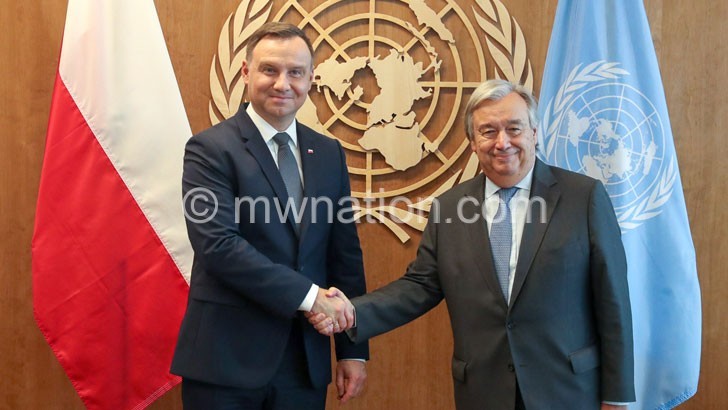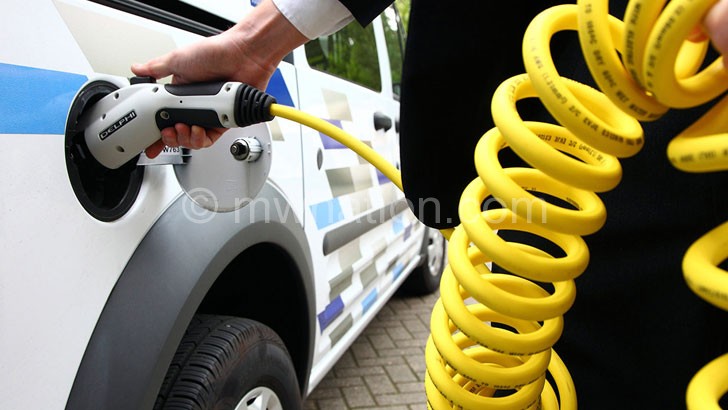Five things about COP24 so far
AsCOP24 draws to a close on Saturday, we unpack some of the burning issues about the eventful climate talks in a controversial setting.

1. What is COP24?
First things first. COP24 is one of numerous acronyms you must cope with when you are in the middle of global climate talks—and these stunners come more frequently than rains are falling in Malawi, Zimbabwe, South Africa and other fragile economies hit hard by climate change.
Ordinarily,the 24th conference of parties to the United Nations Framework Convention on Climate Change (UNFCCC) is the largest annual climate talk.However, this year’s gathering, which brings together 25 000 – 30 000 people from about 200 countries worldwide, marks the deadline for world leaders to adopt the guidelines to make the Paris Agreement on tackling climate change work.
In2015, a similar meeting in the France capital sealed an accord to reduce carbon emissions and global temperature rise well below two degrees Celsius.
The climate talks underway got off to an ambitious start last week with the United Nations General Secretary Antonio Guterres calling for ambitious commitment sand action to tackle climate change. “We cannot afford to fail in Katowice,” he told the parties meeting here.

2. Where is it happening?
The crunch climate talks have entered week two in Katowice, the heartland of Poland’s coal-mining culture. Coal is marketed as “black gold” even in the interiors of COP24 village, which sits on a closed mine of more of the same.
Coal accounts for nearly 80 percent of Poland’s energy mix and employs about 85000 people in this lovely country, the home of 33 most polluted cities in Europe.
When I checked in at Adria Hotel in Ruda Slaska after a 28-hour flight from Malawi where fresh air is more often taken for granted than treasured, the hotel workforce proudly unraveled some stunning secrets about the hospitality complex and the city’s stubborn coal mining culture: This bed and breakfast facility sits on a decommissioned coal mine and the captains of the mining industry have been meeting here long before countries east and west of Europe ignited World War in 1914.
On Friday, guests had a glimpse of the grandeur and pomp of the the giants cashing in on coal had the annual end-of-year party in the chambers of the time-honoured inn. They were all wearing military-ish black suits with a golden lining as do the police and army brass bands. The colorful ceremony was complete with honorific trumpets the size witnessed when President Peter Mutharika goes dining and wining with no mean dignitaries—and they all brandished shinny swords and weighty, hand-decorated, ‘beer-ful’ cups which defiantly state the special place coal and its miners occupy in everything about Katowice and surrounding towns.
The centrality of coal here was clear in President Andrzej Duda’s opening speech in which he defied rising calls for the country to dis invest in coal because it-harms the planet by polluting air and produces overloads of carbon emissions that make climate change worse.
Coal is ranked the worst polluting source of energy along with other fossil fuels that run the motoring industry, but the Poland leader essentially called for more time to nurse the polluter when he called for “a just transition”. He reckoned the world needs to “strike a balance” between sustaining jobs and stepping up climate action.
Among the sponsors of the greatest conference on cutting carbon emissions are three Polish coal companies and the City of Katowice has annoyed environmentalist sand activists by displaying what it calls “green coal” in the COP24 village in an exhibition titled “From Black to Green”
Just like that, the coal-rich hijacked at the slogans at the centre of demands for an end to activities that do not make the planet safer for the current generation and many more to come.
Once upon a time in Paris, green meant green—not as black as coals. Then, “a just transition” really meant a shift towards environmentally sustainable ways of living and doing business in a warmer planet because it is not only good for humanity and the warmer planet, but it makes business sense for everyone.
On Saturday, over 3 000 protestors marched in the coal-rich city to demand a quick stop to all the rhetoric and half-hearted commitments to transition to clean energy in a global push for ambitious climate action and sustainable development goals to ensure everyone uses clean, affordable, sustainable energy. They defied anti-terrorist laws effected in January, which ban demonstrations to send a strong message that turning down global warming and air pollution requires less talk and bold action—and it begins with cleaning up the energy mix of Katowice where trees and buildings are draped with darkish smog as was the case in Birmingham, England, at the height of the Industrial Revolution.

3. Anything to smile about?
Not much really. Waiting for a deal out of any conference of parties requires a lot of patience and optimism. It is like waiting for white smoke announcing the election of a new pope.
With all the canvassing, delay tactics and flip-flopping, progress towards adopting the binding rule book to guide the implementation of the Paris Agreement,nothing is certain from the start. The major news for advocates of clean energy for all is the unveiling of the Katowice Declaration on E-mobility, which restates the European Union’s commitment to accelerate the transition to electric cars.
By putting vehicles powered by petrol and diesel off-road, the western block will tackle one of the worst polluting industries thriving on fossil fuels that are high on carbon emissions and global warmers. The 2018 Energy Report launched at the Sustainable Energy for All Forum in Lisbon calls for swift cutbacks on fossil fuel running the transport sector as the country races to achieve Sustainable Development Goal seven(SDG7)by 2030.
Cleaning up the way we travel is just half the journey in the so-called big shift towards sustainable energy options, Europe does not tick all the vital boxes unless it migrates from coal—a shift easier said than done in wealthy nations.
Tackling the energy-jobs nexus remains a work in progress in Poland, where electric taxis parked almost 100 metres from COP24 venue beg passers-by to “try my ride”. Journalists are rarely not shy to try new innovations, so we jumped into one of these new cars on the block. The Johnny in the driving seat was candid: “These cars will soon be the big thing in Europe, but they are not yet as reliable as a traditional car running on diesel or petrol. It can only go 200 kilometres and race no more than 150 kilometres an hour after a30-minute charge. However, we expect a lot of improvements as technology gets better.”
It is not easy to dispute his optimism. If you believe in the tale of evolution,this could be another dinosaur-to-man story unravelling under your watch. In Malawi and Zimbabwe, we have lived long enough to marvel at how a simple mobile phone demolished nationwide pole-and-wire network that once kept fixed,desktop phones ringing.
e-mobility is one of possible measures to tidy up the transport sector where 92 percent of energy comes from oil products, according to IPCC. That is where 62 percent of global oil demand lie.
4. Energy for all agenda
The small steps to turn down investment in coal-fired power plants in the line of the Chinese-funded $500 million affair expected to generate 300megawatts in Kamwamba Hills in Neno and the roll-out of electric cars could be a big leap to discard the worst polluters in the abundance of energy options billed safer for humanity and the shared planet.
However, a consensus is emerging in the crunch climate talk that the major gains for countries with energy stress really lie in ensuring everyone uses clean energy even for cooking, an everyday activity which exposes women and children to air pollution which kills three Malawians every two hours.According to the International Energy Agency, the world requires $52 billion and$4.4 billion to achieve universal electrification and clean cooking for all,respectively. However, the future looks bleak and progress remains slow as anew study tracking financial flows in the energy sectors shows the money is not going where it is needed most.
Energising Financial Resources, released by the UN Sustainable Energy for All (SEforAll) in October, rates Malawi among the world’s top 20 nations with the greatest unmet need for energy. In fact, 16 of these countries facing the worst energy poverty are in sub-Saharan Africa where east African tigers—Kenya,Rwanda, Tanzania and Ethiopia—have emerged strong performers.
However,Malawians battered by the worst power blackouts in history and deadly effects of cooking using charcoal and firewood should be worried as the country perches on the 16th position in terms of financial flows for energy transformation as huge sums are shipped to big leapers, such as Bangladesh,Kenya and Tanzania.
“We need three things: focus, reforms and investment,” says SE for All director of policy Glen Pearce. “Where do we focus our energy? We need to concentrate on countries that are not getting financial flows necessary. However, we tracked about $39 billion invested in electrification, but less than $2 billion go to the most needy countries in sub-Saharan countries, minus Kenya. To get things moving, the high priority countries need reforms. We don’t need investment from the big boys—World Bank and Africa Development Bank—but also local partners,including the private sector.”
He called for countries to look beyond electrification and ramp up efforts towards clean cooking, a smoky sector where the researchers tracked just K32 million in circulation at a time it requires $4.4 billion a year to ensure no one uses coal, charcoal, firewood and other polluting energy for cooking by 2030
Amix of policy reforms and political will have turned east Africa into a favorable destination for energy investors—and energy access in Kenya has more than doubled from 32 percent to 75 percent since 2014, according to deputy director of renewable energy Esther Wang’ombe.
But Federico Mazza, the lead author of the SEforAll tracker, has a word for financiers: “Donors should step back and seriously figure out where to invest their money.”
Equally worried is Reginald Mapfumo, the programme manager at HIVOS Renewable in Southern Africa. He is concerned that multi-billion-dollar financial pledges made by wealthy nations are “not really translating into kilowatts” in least developed countries, including Malawi and Zimbabwe where the Dutch organisation promotes decentralized renewable power plants or mini-grids.
“We get excited and encouraged because a lot of funds get pledged at COP and other global conferences, but the truth of the matter is that we don’t get to see these funds on the ground. Where does the money go? The major argument is that systems in sub-Saharan countries are weak, but what are we doing to strengthen transparency and accountability systems?”
Low investment in the ailing energy sector has left Malawi turning to coal and diesel to top up its limited power supply, with little or no hope in sight for households, schools, hospitals and productive sectors hit hard by lengthy power cuts.
5. Dziekuje or no thanks?
Anywhere you go, the polite people of Poland end every face to face interaction with‘dziekuje’—thank you. But is there anything to be thankful about at the climate talks winding up on Saturday in Poland?
The stand by the US, Saudi Arabia, Russia and Kuwait and other wealthy nations to reject rising demands to put into consideration new evidence of rising carbon emissions and global warming in the ongoing talks has watered down optimism here in Katowice.
On Saturday, the negotiators spent hours debating whether to “welcome’ the new IPCC report or just to take note of the findings released in October? As expected, the heavyweights high on fossil fuels bullied the weaklings to settle for the less binding terms—“just take note”, they said.
Such are the gains registers by the time-wasters and half-hearted parties to the climate action pact sealed in Paris three years ago where they wasted almost a week discussing the elementary lexical differences between ‘shall’ and ‘will’—a debate that was settled in the chambers of the US Congress where the less obligatory ‘will’ prevailed.
As the deniers stop at nothing to delay the deal, another time-wasting in the highly anticipated Katowice Rule book is that countries demanding greater funding for adaptation and mitigation spent hours discussing on the appropriateness of putting their nationally determined climate change action plans online and whether to make them searchable. And here is the breaking news for the not so tech-savvy negotiators: In the digital era,the ‘search’ button is immutable. No one puts secrets online and goes to sleep convinced it won’t go live at a click of a button.
Still,the words of the UN general secretary ring true: We cannot afford to fail in Katowice and the world is watching.
He said: “It is our job here in Katowice is to finalise the Paris Agreement Work Programme—the rule book for implementation. I remind all Parties that this is a deadline you set for yourselves and it is vital you meet it.
“We need a unifying implementation vision that sets out clear rules, inspires action and promotes raised ambition, based on the principle of equity and common but differentiated responsibilities and respective capabilities, in light of different national circumstances. We have no time for limitless negotiations.





